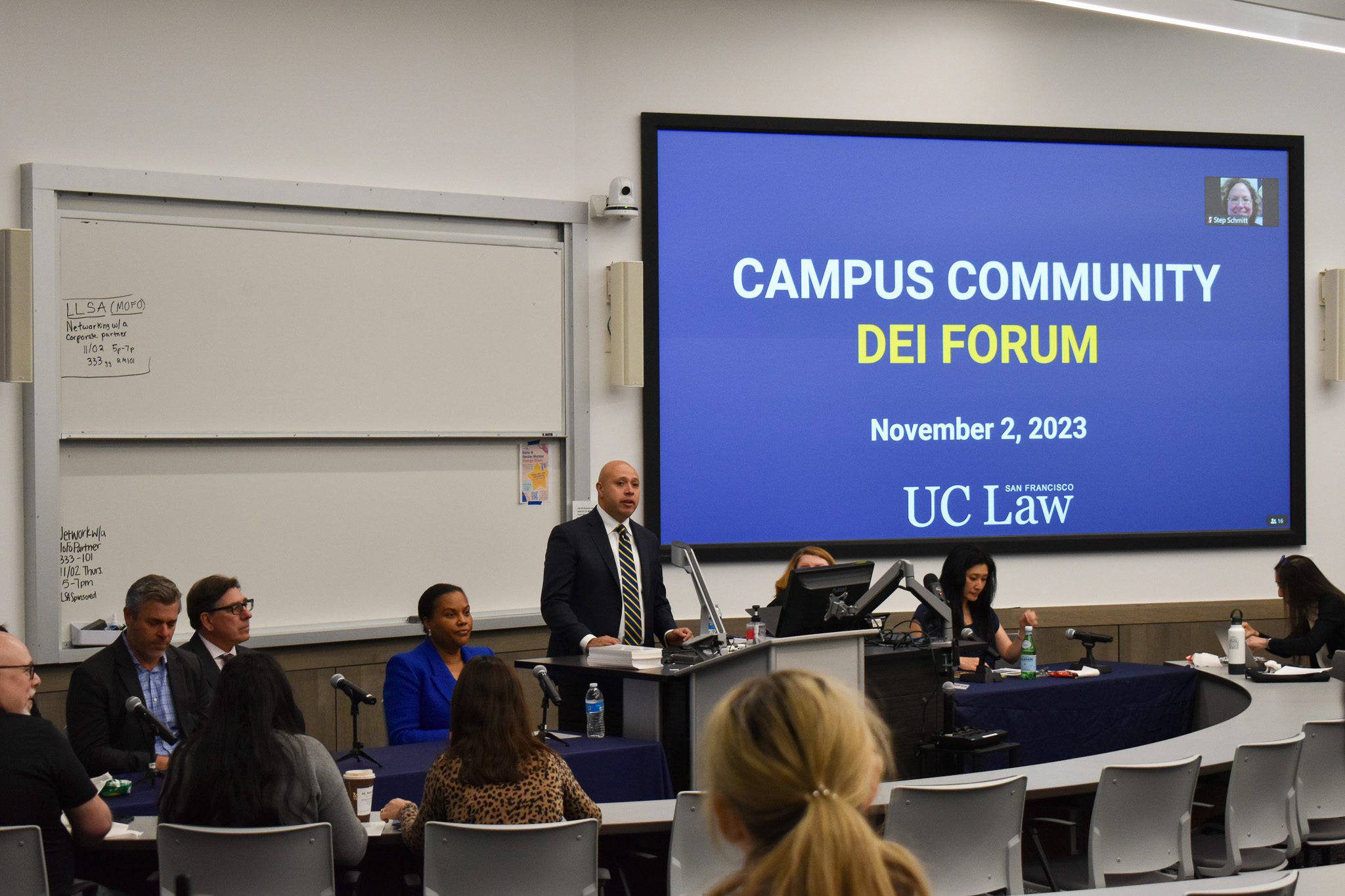Efforts to Boost Diversity, Equity and Inclusion at UC Law SF Reach Far and Wide

Joined by UC Law SF leaders, Chief Diversity Officer Mario Ernesto Lopez ’15 discussed efforts to promote diversity, equity, and inclusion (DEI) across the campus at a DEI Forum in November.
From campus departments and enrollment initiatives to student and alumni affinity groups, UC Law SF is working on multiple fronts to foster a more diverse and welcoming environment for all on campus.
Law school leaders shared details of recent successes and ongoing efforts to advance the values of diversity, equity, and inclusion (DEI) at the annual campus-wide DEI Forum in November. Chancellor & Dean David Faigman explained how efforts to promote DEI are not limited to a single person or department. Rather, they permeate every facet of the law school and its community.
“When we think about what DEI really means, it’s what it means everywhere on the campus — through prospective admissions, current students, LEOP advising, alumni, employment – every aspect of our campus,” he said.
Chief Diversity Officer Mario Ernesto Lopez ’15 hailed the law school’s recent achievements in attracting more diverse students to attend UC Law SF and the increase of diversity in its prestigious competition teams. This fall, the law school welcomed one of the most diverse first-year classes in its history.
Lopez has been working with Faigman to build more relationships with Historically Black Colleges and Universities (HBCUs). Earlier this year, UC Law SF joined the Cal LAW Pathways Program, which builds pipelines to law school for diverse students from California high schools, community colleges, and four-year universities.
“It’s very important to us, especially being a state institution, that we make sure we reach out to students that sometimes are overlooked in our system as a state,” Lopez said.
The law school has also expanded outreach at California State University schools, and the Admissions Office continues to attend recruitment fairs at HBCUs and Hispanic-Serving Institutions (HSIs), among the almost 100 outreach events held last year. Additionally, the Admissions Office hosted its sixth annual diversity open house, inviting prospective students to participate in a mock admissions committee session and learn from diverse students, professors, and staff members.
“It’s a way to support prospective students who might not have access to mentoring, private tutoring, and consultants that others might have,” said Dean of Enrollment Management June Sakamoto. “We want to make this as level a playing field as possible.”
Another longstanding program that boosts DEI on campus is the 54-year-old Legal Education Opportunity Program (LEOP), which admits and supports law students who have faced significant disadvantages and adversity. The one-of-a-kind program provides financial scholarships, academic and bar support, community building, faculty mentors, and professional development.
“At the end of the day, my job is not only to produce students who can pass the bar and become attorneys, but who can be productive, highly talented attorneys who are going to be a credit to this institution, this program, and the legal profession,” Assistant Dean of LEOP Elizabeth McGriff ‘96 said.
UC Law SF offers accommodations through its Disability Resource Program and provides free, confidential support to community members impacted by interpersonal violence through the Center for Advocacy, Resources, and Education (CARE). The Student Services department oversees the Food Pantry to support students who experience food insecurity. It also coordinates support for students who are parents or have caregiving responsibilities. Additionally, the department supports student affinity groups and hosts multiple DEI-minded panels, trainings, and events throughout the school year.
“Our goal is always to provide individualized support and create conditions in which students can thrive,” Dean of Students Tiffany Gabrielson said.
The law school’s DEI efforts don’t stop at graduation. Over the last few years, the Alumni Association has supported graduates in launching new Black, Latinx, and LGTBQ+ alumni affinity groups. They have also worked to create new scholarship funds for members of student affinity groups.
“These groups are 100% volunteer-run by alumni, and they really focus on partnering with the student group that are adjacent to them,” said Alumni Association Executive Director Meredith Jaggard.
On top of these efforts, the law school also has a DEI Working Group, made up of students, faculty, and staff members, that helps advise the law school on DEI issues. The group recently helped establish a new set of Community Principles that were approved by Chancellor & Dean David Faigman. These are aspirational goals that seek to foster a more equitable, welcoming, kind, and affirming environment at UC Law SF.
Wrapping up this year’s forum, Faigman reminded all members of the UC Law SF community that he and other law school leaders are there to support them.
“If there are issues you’re seeing on campus that you want to bring to our attention, go out of your way to come see us and talk to us, and we’ll do the best we can to support you in every way possible,” Faigman said.